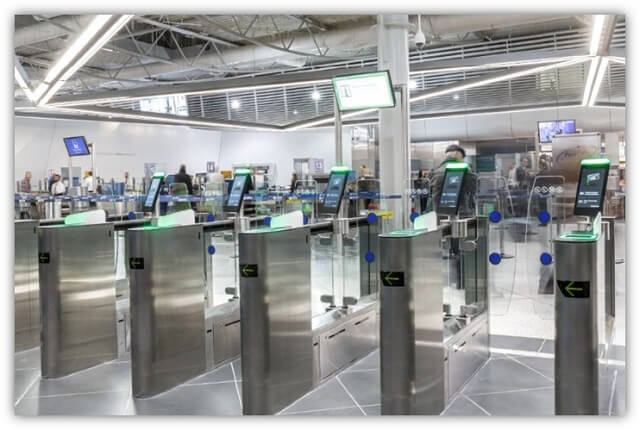Διευκρινίσεις παρέχει το υπουργείο εξωτερικών για τις αεροπορικές αφίξεις επισκεπτών στην Ελλάδα και σε σχετική οδηγία αναφέρει πως υπάρχουν προβλέψεις για αεροδρόμια υψηλού κινδύνου, όπως προκύπτουν από την λίστα της Ευρωπαϊκής Υπηρεσίας Ασφάλειας της Αεροπλοΐας (ΕΑSA).
Με ανακοίνωσή του με τίτλο “η Ελλάδα καλωσορίζει τον κόσμο”, το υπουργείο ενημερώνει για τις φάσεις σταδιακής άρσης των περιορισμών στα σύνορα και τις πτήσεις και έχει απαντήσεις σε ένα ερωτηματολόγιο που προσπαθεί να εξηγήσει τους κανόνες για τη νέα πραγματικότητα όσον αφορά την υποδοχή των τουριστών.
Σύμφωνα με τις σχετικές αποφάσεις προβλέπονται τρεις φάσεις:
31/5-15/6: θα γίνεται τεστ σε όλους όσοι εισέρχονται στην Ελλάδα. Όσοι είναι θετικοί θα τίθενται σε καραντίνα 14 ημερών, ενώ όσοι είναι αρνητικοί σε κατ’ οίκον καραντίνα για 7 ημέρες.
Από 15/6: Το τέστ θα είναι υποχρεωτικό μόνο για όσους προέρχονται από τη λίστα αεροδρομίων υψηλού κινδύνου με βάση την EASA. Το ίδιο ισχύει και για τις περιόδους καραντίνας. Στις πτήσεις από όλα τα υπόλοιπα αεροδρόμια θα γίνονται δειγματοληπτικά τεστ.
Από 1/7: Θα γίνονται δειγματοληπτικά τεστ για όλες τις πτήσεις ανεξαρτήτως αεροδρομίου προέλευσης.
 Σε ανακοίνωσή της η βουλευτής του ΣΥΡΙΖΑ κα. Κατερίνα Νοτοπούλου, τονίζει: “Χθες το Υπουργείο Τουρισμού ανακοίνωσε τη λίστα με τις 29 χώρες, που από τις 15 Ιουνίου, «ανοίγουν τα σύνορα» για τους τουρίστες , με αεροπορικές πτήσεις προς Αθήνα και Θεσσαλονίκη η οποία σύμφωνα με το Υπουργείο Τουρισμού διαμορφώθηκε ύστερα από μελέτη του επιδημιολογικού προφίλ των χωρών προέλευσης των τουριστών και τη σύμφωνη γνώμη της επιτροπής Λοιμωξιολόγων.
Σε ανακοίνωσή της η βουλευτής του ΣΥΡΙΖΑ κα. Κατερίνα Νοτοπούλου, τονίζει: “Χθες το Υπουργείο Τουρισμού ανακοίνωσε τη λίστα με τις 29 χώρες, που από τις 15 Ιουνίου, «ανοίγουν τα σύνορα» για τους τουρίστες , με αεροπορικές πτήσεις προς Αθήνα και Θεσσαλονίκη η οποία σύμφωνα με το Υπουργείο Τουρισμού διαμορφώθηκε ύστερα από μελέτη του επιδημιολογικού προφίλ των χωρών προέλευσης των τουριστών και τη σύμφωνη γνώμη της επιτροπής Λοιμωξιολόγων.
Σήμερα όμως το Υπουργείο Τουρισμού αναρτά νέα διαφορετική ανακοίνωση του Υπουργείου Εξωτερικών, σύμφωνα με την οποία επιτρέπονται οι Διεθνείς πτήσεις προς τα αεροδρόμια Αθήνας και Θεσσαλονίκης και απο περιοχές που συμπεριλαμβάνονται στην λίστα με τα αεροδρόμια υψηλού κινδύνου που συνέταξε ο Ευρωπαϊκός Οργανισμός Ασφάλειας της Αεροπορίας (EASA). (https://www.easa.europa.eu/SD-2020-01/Airports#group-easa-downloads), με υποχρεωτικά τεστ για όποιον έρχεται απο τις περιοχές εκείνες.
Όταν αποφασίσει η κυβέρνηση του κ. Μητσοτάκη τι θα ισχύσει τελικά ως προς το άνοιγμα των συνόρων, ας βρει το θάρρος να ενημερώσει υπεύθυνα τους Έλληνες πολίτες”.
Η ανακοίνωση του ΥΠΕΞ
Η πρωτότυπη ανακοίνωση του ΥΠΕΞ έχει ως ακολούθως:
“Greece welcomes the world
Greece is ready once again to welcome the world. Here is how:
Phase 1 – Until 15 June
International flights are allowed only into Athens airport.
All visitors are tested upon arrival and are required to stay overnight at a designated hotel. If the test is negative, then the passenger self-quarantines for 7 days. If the test is positive, the passenger is quarantined under supervision for 14 days.
Phase 2 – Bridge phase- 15 June to 30 June
International flights are allowed into Athens and Thessaloniki airports.
If your travel originated from an airport not in the EASA affected area list (https://www.easa.europa.eu/SD-2020-01/Airports#group-easa-downloads), then you are only subject to random tests upon arrival.
If you originate from an airport on the EASA affected area list, then you will be tested upon arrival. An overnight stay at a designated hotel is required. If the test is negative then the passenger self-quarantines for 7 days. If the test is positive, the passenger is quarantined under supervision for 14 days.
Phase 3 – 1 July onwards
International flights are allowed into all airports in Greece.
Visitors are subject to random tests upon arrival.
Additional restrictions regarding certain countries will be announced at a later date.
In addition:
Land border arrivals from Albania, North Macedonia and Bulgaria will be allowed as of 15 June. Visitors will be subject to random tests upon arrival.
Arrivals by sea will be allowed as of 1 July. Visitors will be subject to random tests upon arrival.
Greece at any stage retains the right to modify any of the above in light of changing circumstances.
Frequent Questions and Answers
Q: The European Commission has recommended to member States to restrict non-essential travel from third countries until 15 June 2020. Is this applicable to Greece?
A: Yes. Non-essential travel from third countries to Greece is restricted until 15 June 2020.
Q: Until 15 June 2020, all travelers arriving in Greece undergo a compulsory Covid-19 test and a quarantine. Is this applicable to citizens of all countries?
A: Yes. All travelers, irrespective of nationality, including nationals of EU and Schengen Plus countries, are tested and quarantined. The same rules obviously apply to Greek citizens. If the test is negative, they are placed in a 7-day self-quarantine; if the test is positive, they are under monitored 14-day quarantine. The measures are for the protection of public health and are applicable to all travelers without discrimination.
Q: Are there direct commercial flights from international destination to all Greek airports?
A: Throughout the Covid-19 crisis, there have been direct international flights from many Schengen Plus airports. Until 15 June, international flights arrive only into Athens International Airport. As of 15 June, international flights resume at the Thessaloniki Airport and as of 1 July international flights resume to all Greek airports. Domestic flights have been allowed throughout.
Q: What will change on 15 June 2020?
A: 15 June inaugurates the gradual return to normalcy. Compulsory testing and quarantine will be limited only to travelers, irrespective of nationality, arriving from airports of affected areas with high risk of transmission of the Covid-19 infection, as assessed by the European Union Aviation Safety Agency (EASA). The list is constantly updated and travelers should check before traveling (https://www.easa.europa.eu/SD-2020-01/Airports#group-easa-downloads).
All other travelers will enter restriction-free and may be subject to random tests upon arrival.
Q: What will change on 1 July 2020?
A: All travelers will be subject to random tests upon arrival. Additional restrictions regarding certain countries will be announced at a later date.
Q: Is there a difference whether travel is direct or via transit?
A: No. The same rules apply whether travel is completed directly point-to-point or via transit”.




